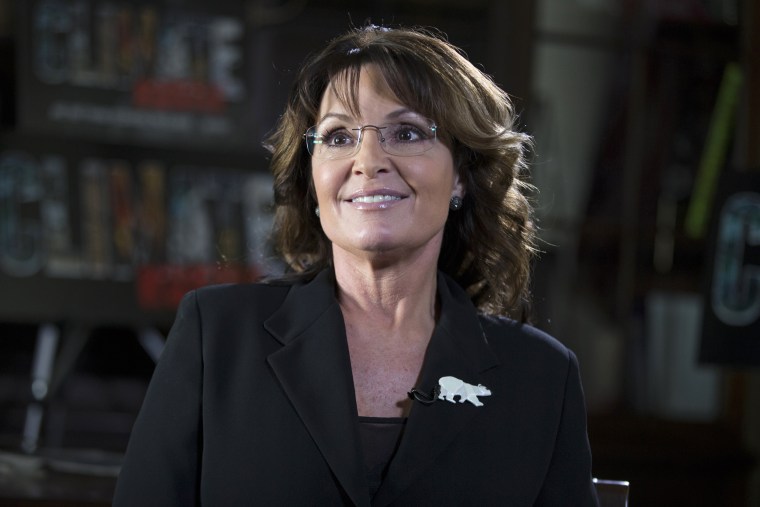On Monday, the manager of Elio's, an Italian restaurant on Manhattan's Upper East Side, confirmed that former Alaska governor and vice presidential candidate Sarah Palin ate indoors there Saturday night — two days before she tested positive for Covid-19.
The restaurant allowed Palin, who is unvaccinated, to dine in violation of New York City's regulation requiring anyone who eats indoors to show proof of vaccination.
It's not clear whether Palin knew she was infected. But even if she didn't, it's especially egregious that, after choosing not to get vaccinated, she chose to go maskless in an indoor venue.
In a statement, manager Luca Guaitolini, who said he was not working Saturday night, said the restaurant believes in and enforces the vaccine mandate. He described the event in a statement as an "isolated incident — and unfortunate oversight." He told The New York Times that Palin was dining with a regular patron and that although the restaurant checks first-time customers, it doesn't check its regulars. He also told the Times that the restaurant was "trying to get to the bottom" of what happened.
But Elio's should nevertheless be fined by the city for not enforcing the regulation and allowing the unvaccinated Palin to dine indoors. Doing so would send an important signal that no one is exempt from the rules — even if they are celebrities and have lots of Twitter followers. It's a message many people in our society need to hear right now.
People like Palin are, by every definition, extremely influential. When they're not required to follow the rules put in place to protect the public — like when they're allowed to eat in a restaurant without producing a vaccine card — it sends an especially powerful signal to their followers that such behavior is OK.
Had she been asked for the card, she wouldn't have been able to provide it, leading to the bigger issue. Palin has chosen not to get vaccinated, which isn't acceptable. It's an astonishingly misguided and selfish decision that puts everyone in the community — especially young kids like mine who aren't eligible for vaccines and therefore rely on those around them to be immunized — at risk.
It's not clear whether Palin knew she was infected. But even if she didn't, it's especially egregious that, after choosing not to get vaccinated, she chose to go maskless in an indoor venue. This is a setting where she could — and indeed we now know very well may — have exposed other patrons to the contagious virus. If anything, we should expect people like Palin, who has experience as a public servant, to be especially careful to make informed decisions in the public interest, knowing that she's a role model for many.
The practice of not holding influential people to the rules is a broader cultural phenomenon, and it's toxic for our society. For example, one of the most shocking revelations of Facebook whistleblower Frances Haugen, before her identity was revealed, was that the company operates a program called XCheck or "cross check" that exempts the accounts of high-profile people from the same moderation practices applied to other users.
According to a Wall Street Journal report from September, the program allowed posts (including false claims that vaccines are deadly) that violated Facebook's community standards to be viewed 16.4 billion times in 2020 before removing them. In a statement to the Journal, Facebook spokesperson Andy Stone acknowledged that it's fair to be critical of XCheck but said it "was designed for an important reason: to create an additional step so we can accurately enforce policies on content that could require more understanding" and that "Facebook itself identified the issues with cross check and has been working to address them."
Of course, seeing prominent people get away with flouting the platform's community standards sends a message to other users that it's acceptable. It might therefore help explain why social platforms have become cesspools of misinformation about Covid and hateful content.
Another lesson to be learned here is that letting famous people disregard the rules isn't only bad for society, but it’s also a dumb move for the organizations that allow or enable it. For example, Elio's enjoys a buzzy clientele of big-name politicians, celebrities and business people. Some of those sophisticated patrons, who are now getting calls that they might have been exposed to the virus on Saturdayor who are reading about this incident in the news, may not exactly be clamoring to return to the restaurant.
Hopefully, others are taking note. Every organization needs to enforce rules designed to protect public safety and well-being universally, even and, in fact, especially when the people violating them are famous.

